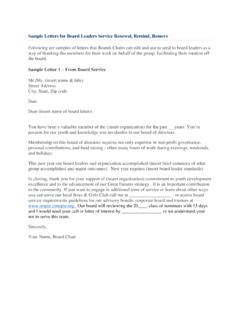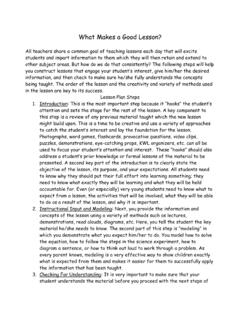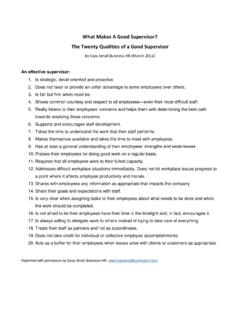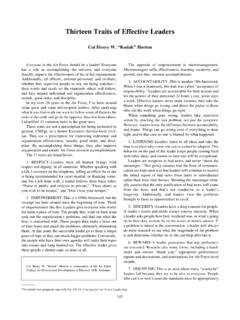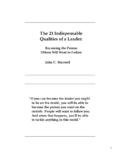Transcription of What Makes Great Boards Great
1 what Makes Great Boards Greatby Jeffrey r0209hn the wakeof the meltdowns of such once Great companies as Adel-phia, Enron, Tyco, and WorldCom,enormous attention has been focusedon the companies Boards . Were the di-rectors asleep at the wheel? In cahootswith corrupt management teams? Sim-ply incompetent? It seems inconceiv-able that business disasters of such mag-nitude could happen without gross oreven criminal negligence on the part ofboard members. And yet a close exami-nation of those Boards reveals no broadpattern of incompetence or fact, the Boards followed most of theaccepted standards for board opera-tions: Members showed up for meet-ings; they had lots of personal moneyinvested in the company; audit com-mittees, compensation committees, andcodes of ethics were in place; the boardsweren t too small, too big, too old, or tooyoung. Finally, while some companieshave had problems with director in-dependence because of the number of insiders on their Boards , this was nottrue of all the failed Boards , and boardmakeup was generally the same forcompanies with failed Boards and thosewith well-managed other words, they passed the teststhat would normally be applied to ascer-tain whether a board of directors waslikely to do a good job.
2 And that s pre-cisely what s so scary about these the breakdowns through thelens of my 25 years of experience study-ing board performance and CEO lead-ership leads me to one conclusion: It stime for some fundamentally new think-ing about how corporate Boards shouldoperate and be evaluated. We need toconsider not only how we structure thework of a board but also how we man-age the social system a board actuallyis. We ll be fighting the wrong war ifwe simply tighten procedural rules forboards and ignore their more pressingneed to be strong, high-functioningwork groups whose members trust andchallenge one another and engage di-rectly with senior managers on criticalissues facing Inadequacy of Conventional WisdomOver time, good-governance advocateshave developed no shortage of remediesfor failures of governance. Most of theseremedies are structural: They re con-2 Copyright 2002 by Harvard Business School Publishing Corporation. All rights PracticeWhat Makes Great Boardsby Jeffrey s not rules and s the way people work with rules, procedures, compo-sition of committees, and the like, andtogether they re supposed to producevigilant, involved Boards .
3 However, goodand bad companies alike have alreadyadopted most of those practices. Let stake a look at some of the most Meeting meeting attendance is considereda hallmark of the conscientious matters a lot and, still, as shareholderactivist Nell Minow comments, Somebig names on the showup due to other commitments, andwhen they show, they re not prepared. Indeed, some WorldCom directors wereon more than ten Boards , so how wellprepared could they be? Fortune s 2001list of the most-admired compa-nies reveals no difference in the atten-dance records of board members of themost- and least-admired from the Corporate Library, a cor-porate governance Web site and data-base cofounded by Minow, show thesame acceptable attendance records atboth kinds of companies. Good atten-dance is important for individual boardmembers, but it alone doesn t seem tohave much impact on whether compa-nies are mem-bers are assumed to be more vigilant ifthey hold big chunks of the company sstock but data from the Corporate Li-brary don t suggest that this measure byitself separates good Boards from bad,either.
4 Several members of the board ofGE,Fortune s most-admired corporationin 2001, had less than $100,000 of eq-uity, whereas all board members of theleast-admired companies held substan-tial equity stakes. Not only did all butone of the Enron board members ownimpressive amounts of equity in thecompany, but some were still buying asthe shares Member of Institutional ShareholderServices, like other expert observers,has frequently questioned the finan-cial literacy of troubled companies audit committee members. It s cer-tainly true that many board membershave their jobs because they re famous,rich, well connected anything but financially literate. But just as manyboard members have the training andsmarts to detect problems and some-how fail to do their jobs anyway. Atthe time of their meltdowns, for ex-ample, Kmart had six current or recentFortune500 CEOs on its board , andWarnaco had several prominent fi-nanciers, a well-known retail analyst,and a top-tier CEO; all those excellentcredentials made little difference.
5 Onthis measure, again, we find that For-tune s most- and least-admired compa-nies alike had board members with thetraining and experience to analyzecomplex financial issues and to under-stand what kinds of risks a company istaking Enron s disastrously complexfinancial schemes, no corporation couldhave had more appropriate financialcompetencies and experience on itsboard. The list includes a former Stan-ford dean who is an accounting profes-sor, the former CEO of an insurancecompany, the former CEO of an inter-national bank, a hedge fund manager, aprominent Asian financier, and an econ-omist who is the former head of the s Commodity Futures Trad-ing Commission. Yet members of thisboard have claimed to have been con-fused by Enron s financial Member toone governance expert, Enron melteddown because it lacks independent di-rectors and several are quite long in thetooth. His remarks reflect a general be-lief that Boards become less effective asthe average age of their members research on executives over the pasttwo decades has shown that, to the con-trary, age is often an asset, and this gen-eral finding is supported by board datafrom the Corporate Library.
6 CharlesSchwab, Cisco, and Home Depot allhave had several board members whoare well into their sixties. Michael Dell(Dell Computer placed tenth on For-tune s 2001 list of most-admired compa-nies) told me that when he incorporatedin 1987, as a 21-year-old college dropout,he found it invaluable to have then 70-year-old George Kozmetsky, Teledyne svisionary founder and the former deanof the McCombs School of Business inAustin, Texas, serve on the board ; Koz-metsky stayed for more than a Past CEO s com-plicated reality is that sometimes a pastCEO s presence is helpful and some-times it s not. In the years I served onand even chaired commissions for theNational Association of Corporate Di-rectors (NACD), some commissionersregularly vilified the old dragons whohaunted successors by serving on certain cases, this can be a problem;one can only imagine board meetings atWarnaco, where deposed CEO LindaWachner voted her 9%of the company sequity for several months after her No-vember 2001 termination.
7 Alternately,a retired CEO can play an invaluable in-ternal role as a mentor, sounding board ,and link to critical outside parties. It shard to imagine anyone arguing thatIntel, Southwest Airlines, or Home De-pot would be better off if their legend-ary retired CEOs Andy Grove, Herb Kel-leher, or Bernie Marcus had just gonehome to play and stock exchange heavy-weights alike have argued that boardswith too many insiders are less cleanand less accountable. Some argue thatTyco s confusing spiral of acquisitionsand the apparent self-dealing of theCEO at Adelphia Communications mighthave been less likely if their boardshadn t been dominated by insiders. In-deed, the New York Stock Exchange sCorporate Accountability and StandardsCommittee recently proposed requir-ing that the majority of a NYSE-listedcorporation s directors be indepen-dent this in response to the recent gov-ernance disasters. Governance reformproposals are also being developed bysuch business groups as the ConferenceBoard and the Business Roundtable.
8 Yetagain, if you judge the most- and least-admired companies on Fortune s 2001list against this standard, no meaningfuldistinction emerges. Least-admired com-panies like LTV Steel, CKE Restaurants,Kmart, Warnaco, Trump Hotels andCasino Resorts, Federal-Mogul, and USseptember 20023 what Makes Great Boards Great BEST PRACTICEA irways had only one or two inside directors on their Boards ; Enron hadonly two. By contrast, at various times intheir histories, Home Depot had five in-sider directors on its 11-person board ,Intel had three on a nine-person board ,and Southwest Airlines had three on aneight-person board . Typically, half ofMicrosoft s board are insiders. Cur-rently, three of Warren Buffett s sevenBerkshire Hathaway board membershave the Buffett name, and another ishis long-term vice Parcel Service hasranked high on Fortune s list ofmost-admired companies sincethe list was started, and half ofthe UPS management commit-tee is on its board . Three out-side board members have toldme how well plugged-in theyhave felt over the years because the in-side members are very candid and wellinformed.
9 From what the outside direc-tors have seen, none of the insiders hasever been afraid to debate a point withthe boss, the Size and hostof other issues that good-governance ad-vocates propose turn out to be eithernot truly important or already in placeat both good and bad companies. Takeboard size. Small s considered good,big s considered bad. But big boardsexist at some Great and admired com-panies GE, Wal-Mart, and Schwab along with some poorly performingcompanies like US Airways and AT& the same time, small Boards are partof the landscape at good companies likeBerkshire Hathaway and Microsoft andsome not-so-good companies like area where good companiesdon t necessarily conform to the adviceof good-governance advocates: execu-tive sessions, which give Boards thechance to evaluate their CEOs withoutinterference. Executive sessions are alsosometimes coupled with a designatedlead director. But GE, the most-admiredcompany in the country in 2001, didn tallow executive sessions in Jack Welch sday.
10 Said Ken Langone, who serves onthe Boards of both GE and Home Depot, Jack will give you all the time in theworld to raise any issue you want, but hewants to be there during the discussion. GE s not alone; many good Boards neverhave meetings that exclude the supposed safeguard of goodgovernance audit and compensationcommittees turns out to be near uni-versal. A 2001 survey by the NACD andInstitutional Shareholder Services of5,000 public company Boards shows that 99%have audit committees, and 91%have compensation committees. Sun-beam, Enron, Cendant, McKessonHBOC,and Waste Management all had the req-uisite number of committees and guide-lines, yet accounting scandals still pene-trated this governance shield. Let s notforget, either, that the audit committeeat Enron was consulted about suspend-ing the conflict-of-interest guidelines and willingly agreed to Importance of the Human ElementSo if following good-governance regu-latory recipes doesn t produce goodboards, what does?

